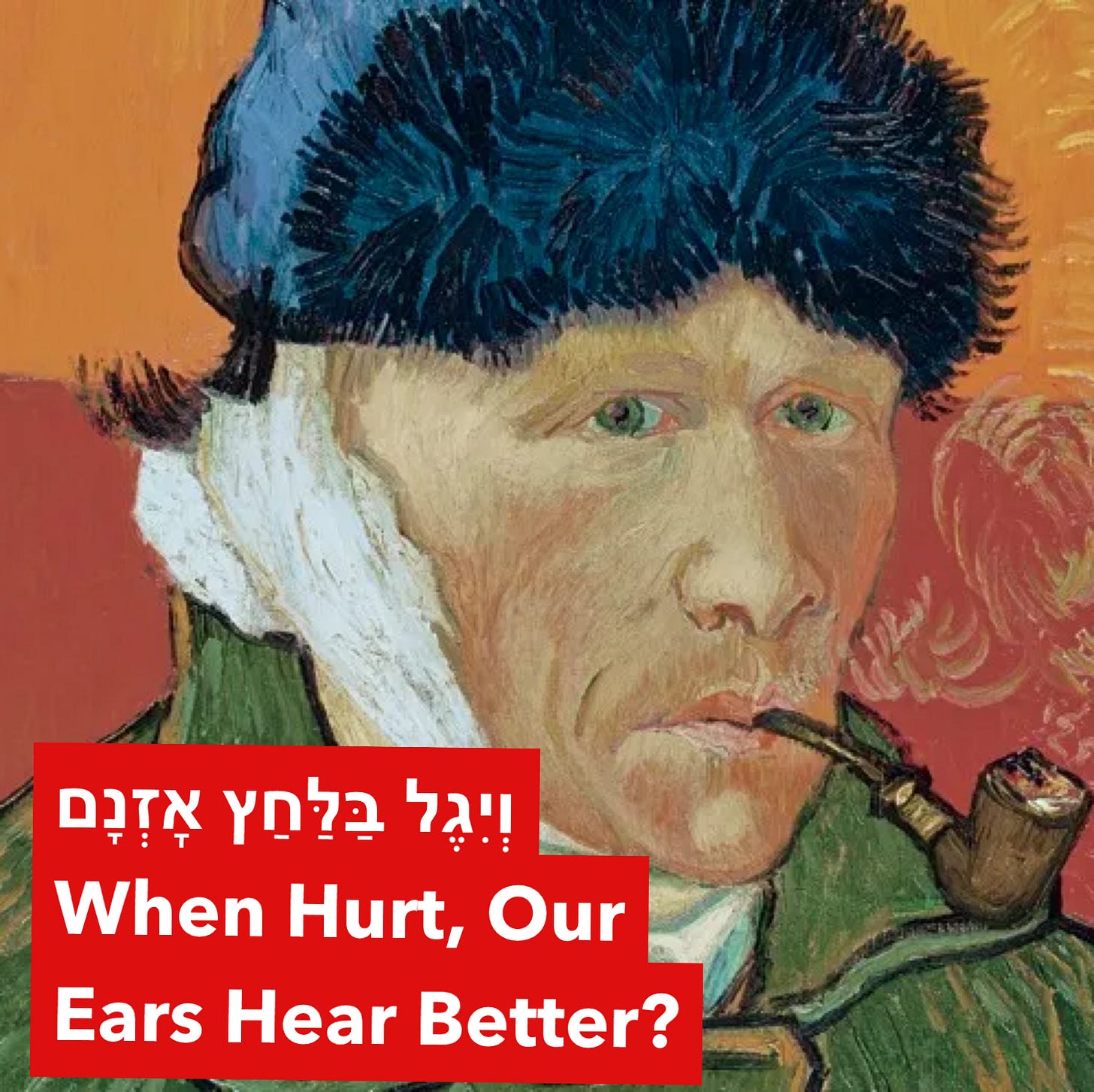A famous artist’s suffering and possible self severing of his ear although it may have been inflicted upon him by another artist is a well known image with a story about the steep price of pain.
How does this modern tale converse with the plea for deeper listening that we can hear when ears appear in this chapter of Job?
Elihu keeps at it—insisting that suffering may be punishment for wrongdoing, but it is always an opportunity for soul work, humility, and faith. The lower you go, the higher you can rise. Faith in God’s goodness, despite pain, is the way to endure every challenge. God, Elihu claims, is the one who:
יְחַלֵּץ עָנִי בְעׇנְיוֹ וְיִגֶל בַּלַּחַץ אׇזְנָם׃
"Rescuing the lowly from their affliction, God opens their understanding through distress."
Job 36:15
The original Hebrew is more specific and sensory - and is about the human ear’s abilities.
The Koren Bible translates this as “He delivers the poor by means of his affliction, and opens their ears.” Robert Alter’s version: “He frees the afflicted through their affliction, and through oppression, He lays bare their ear.”
What stands out in both is the emphasis on listening. Through suffering, Elihu argues, our ears are opened. Pain presses the most critical questions out of us, shaping our deepest poetry, our most urgent search for meaning.
Is suffering the refining fire that forces us to pay attention? to listen to the still small voice beyond the noise? To discern reality more subtle than our normal mortal being?
Rabbi Kushner, in The Book of Job: When Bad Things Happened to a Good Person, helps frame Elihu’s argument by quoting C.S. Lewis and Harvard Divinity School research:
“At one point, Elihu suggests that sometimes God inflicts suffering on innocent people to impel them to ask, ‘What might I have done to deserve this?’ and examine their lives more closely. People are made better through their suffering. It inoculates them against the danger of self-righteousness and imbues them with a sense of kinship with fellow sufferers. There is something ‘unripe’ about the person who has never tasted disappointment or sorrow.”
Kushner connects this to Lewis’s idea of pain as “God’s chisel to perfect us.” James Davies, writing in the Harvard Divinity Bulletin, takes this even further:
“The positive model of suffering holds that suffering can have a redemptive role to play in human life, that from affliction there can be derived some unexpected gains.… Suffering is a kind of liminal region through which we can pass from a worse to a better place.”
Davies even invokes Psalm 119:71:
“It has been good for me that I was afflicted, that I might be well instructed and learn Your holy laws.”
Like David’s psalm and Lewis’ conviction, Elihu’s theology is strong, poetic, and persuasive—but does it reach Job’s heart? Or is it just another philosophical exercise, destined to scatter in the wind like so many sermons before it? Even if suffering might bring us closer to some inner truth, is it ever worth it? What would Van Gogh say?
As we watch the world burn—wars rage, injustice deepen, and suffering stretch across borders—Elihu’s words still resonate. Is there meaning to be found in the fire? Can suffering refine us, or does it simply break us? What is here to hear?
Elihu has one more speech to wrap up his impressive if complex theology: No pain, no gain. His words will no impact on Job. Perhaps he too was tone-deaf to the wiser and more loving ways with which words can open both heart and ears to tough truths.
Image: Vincent Van Gogh, Self-Portrait with Bandaged Ear, 1889
Below the Bible Belt: 929 chapters, 42 months, daily reflections.
Become a free or paid subscriber and join Rabbi Amichai’s 3+ years interactive online quest to question, queer + re-read between the lines of the entire Hebrew Bible. Enjoy daily posts, weekly videos and monthly learning sessions. 2022-2025.
Become a Paid Subscriber? Thank you for your support!
#Job #IYOV #Job36 #hebrewbible #כתובים #Ketuvim #Hebrewbible #Tanach #929 #איוב #חכמה #labshul #belowthebiblebelt929
#Elihu #ElihubookofJob #Suffering #VanGogh #VanGogh’sear #nopainnogain #CSLEWISH #dealingwithdepression
#peace #prayforpeace #nomorewar #hope #peaceisposible #life’sbigquestions #innerear #deeplistening #ears #makingsenseofsuffering



